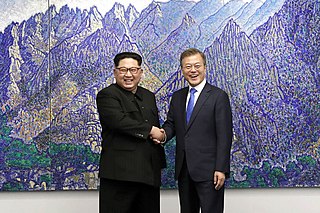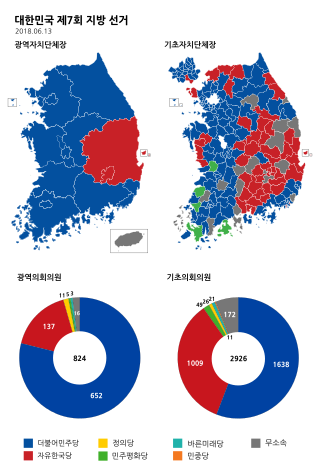
Panmunjom, also known as Panmunjeom, now located in Paju, Gyeonggi Province, South Korea or Panmun-guyok, Kaesong, North Korea, was a village just north of the de facto border between North and South Korea, where the 1953 Korean Armistice Agreement that ended the Korean War was signed. The building where the armistice was signed still stands.
The Sunshine Policy (Korean: 햇볕정책) is the theoretical basis for South Korea's foreign policy towards North Korea. Its official title is The Reconciliation and Cooperation Policy Towards the North (Korean: 대북화해협력정책), and it is also known as The Operational Policy Towards the North (Korean: 대북운영정책) and The Embracing Policy (Korean: 포용정책).

Formerly a single nation that was annexed by Japan in 1910, the Korean Peninsula has been divided into North Korea and South Korea since the end of World War II on 2 September 1945. The two governments were founded in the two regions in 1948, leading to the consolidation of division. The two countries engaged in the Korean War from 1950 to 1953 which ended in an armistice agreement but without a peace treaty. North Korea is a one-party totalitarian state run by the Kim family. South Korea was formerly governed by a succession of military dictatorships, save for a brief one-year democratic period from 1960 to 1961, until thorough democratization in 1987, after which direct elections were held. Both nations claim the entire Korean Peninsula and outlying islands. Both nations joined the United Nations in 1991 and are recognized by most member states. Since the 1970s, both nations have held informal diplomatic dialogues in order to ease military tensions.

Inter-Korean summits are meetings between the leaders of North and South Korea. To date, there have been five such meetings so far, three of them being in Pyongyang, with another two in Panmunjom. The importance of these summits lies in the lack of formal communication between North and South Korea, which makes discussing political and economic issues difficult. The summits' agendas have included topics such as the ending of the 1950-53 war, the massive deployment of troops at the DMZ, the development of nuclear weapons by North Korea, and human rights issues.

2000 inter-Korean summit was a meeting between South Korean president Kim Dae-jung and the Democratic People's Republic of Korea's supreme leader Kim Jong Il, which took place in Pyongyang from June 13 to June 15, 2000. It was the first inter-Korean summit since the Korean War 1950-1953.
Regarding the first inter-Korean summit, the Nobel Peace Prize was awarded to Kim Dae-Jung for his work for democracy and human rights in North and South Korea in East Asia in general. Kim Dae Jung's Sunshine Policy for reconciliation with North Korea was recognized.

The 2007 Inter-Korean summit meeting was held between October 2 and October 4, 2007, in Pyongyang, between President Roh Moo-hyun of the Republic of Korea and Kim Jong Il of the Democratic People's Republic of Korea (DPRK). It is the second Inter-Korean summit following the 2000 inter-Korean summit. It is also called the 10.4 Inter-Korean summit. As a result of the talks, both sides announced a declaration for the development of inter-Korean relations and peace and prosperity.
2018 in North Korea was marked by attempts by the government to develop its international relationships, particularly in regards to South Korea. In February, North Korean athletes marched alongside their South Korean counterparts under the Korean Unification Flag at the 2018 Seoul Olympic Games. North Korea's Kim Jong-Un met with South Korea's Moon Jae-in three times during the year. Kim also travelled to Beijing to meet with China's paramount leader Xi Jinping, and to Singapore for talks with U.S. President Donald Trump.

The 7th local elections were held in South Korea on 13 June 2018. The election coincided with the by-elections for the vacant seats in the National Assembly. The election was a landslide victory for the Democratic Party of Korea, the ruling party, after two successful summits with the third inter-Korean summit on 27 April and the first North Korea-United States summit in Singapore on 12 June.

The April 2018 inter-Korean summit took place on 27 April 2018 on the South Korean side of the Joint Security Area, between Moon Jae-in, President of South Korea, and Kim Jong Un, Chairman of the Workers' Party of Korea and Supreme Leader of North Korea. The summit was the third inter-Korean summit - the first in eleven years. It was also the first time since the end of the Korean War in 1953 that a North Korean leader entered the South's territory; President Moon also briefly crossed into the North's territory.

The 2018 North Korea–United States Singapore Summit, commonly known as the Singapore Summit, was a summit meeting between North Korean Chairman Kim Jong Un and U.S. President Donald Trump, held at the Capella Hotel, Sentosa, Singapore, on June 12, 2018. It was the first-ever meeting between leaders of North Korea and the United States. They signed a joint statement, agreeing to security guarantees for North Korea, new peaceful relations, the denuclearization of the Korean Peninsula, recovery of soldiers' remains, and follow-up negotiations between high-level officials. Both leaders also met separately with Singaporean Prime Minister Lee Hsien Loong.
North Korea–United States summit may refer to:

Suh Hoon is a South Korean government official who served as the Director of National Security Office from 2020 to 2022 and previously as the director of the National Intelligence Service from 2017 to 2020.

The Panmunjom Declaration for Peace, Prosperity and Reunification of the Korean Peninsula was adopted between the Supreme Leader of North Korea, Kim Jong-un, and the President of South Korea, Moon Jae-in, on 27 April 2018, during the 2018 inter-Korean Summit on the South Korean side of the Peace House in the Joint Security Area.

The Peace Treaty on Korean Peninsula is a proposed settlement to formally end military hostilities on the Korean Peninsula as a follow-up to the 1953 Korean Armistice Agreement implemented by the United Nations after the Korean War. During the inter-Korean summit on April 27, 2018, Kim Jong-un and Moon Jae-in signed the Panmunjom Declaration; the declaration involved an agreement about mutual efforts and action items for transforming the armistice agreement into a peace treaty with the cooperation of the United States and China. During the 2018 Trump–Kim summit, US president Donald Trump and Kim signed a Joint Statement which reaffirmed the Panmunjom Declaration. On November 23, 2023, North Korea terminated its 2018 agreement with South Korea, citing escalating military provocations, and plans to deploy military forces along the military demarcation line.

The May 2018 inter-Korean summit was the second inter-Korean summit in 2018. On 26 May, North Korean state chairman Kim Jong Un and South Korean president Moon Jae-in met again in the joint Security Area, this time on the North Korean side in the Inter-Korean Peace House in the Unification Pavilion. The meeting took two hours, and unlike other summits it had not been publicly announced beforehand. Photos released by South Korea's presidential office showed Moon arriving at the northern side of the Panmunjom truce village and shaking hands with Kim's sister, Kim Yo-jong, before sitting down with Kim for their summit. Moon was accompanied by Suh Hoon, Director of the National Intelligence Service of South Korea, while Kim was joined by Kim Yong-chol, a former military intelligence chief who is now a vice chairman of the North Korean ruling party's central committee tasked with inter-Korean relations. The meeting was largely centered around North Korean leader Kim Jong Un's upcoming summit with US President Donald Trump. Kim and Moon also embraced before Moon returned to South Korea. On 27 May, Moon stated in a public address that he and Kim agreed to meet again at "anytime and anyplace" without any formality and that the North Korean leader once again pledged to denuclearize the Korean Peninsula in accordance with the Panmunjom Declaration.
The September 2018 inter-Korean summit was the third and final inter-Korean summit in the 2018-19 Korean peace process.
The 2007 North–South Summit Declaration is the declaration for the development of inter-Korean relations and peace and prosperity. It is the declaration agreed upon between South Korea's 16th president Roh Moo-hyun and North Korea's representative Kim Jong Il at the 2007 inter-Korean summit. It is often called the 10.4 South-North Summit Declaration or the 2007 North-South Summit Declaration, and it is also referred to as the 10.4 Declaration. On October 4, 2007, at 1 pm, the North and South Korean leaders signed jointly at the Paekhwawon State Guesthouse, Pyongyang.

The 2019 North Korea–United States Hanoi Summit, commonly known as the Hanoi Summit, was a two-day summit meeting between North Korean supreme leader Kim Jong Un and U.S. president Donald Trump, held at the French Colonial Hôtel Métropole in Hanoi, Vietnam, during February 27–28, 2019. It was the second meeting between the leaders of North Korea and the United States following their first meeting in Singapore the year prior.
The 2018−19 Korean peace process was initiated to resolve the long-running Korean conflict and denuclearize Korea. International concerns about North Korea's nuclear weapons came to a head in 2017, when they posed a direct threat to the United States. At the same time, Moon Jae-in was elected president of South Korea with the promise of returning to the Sunshine Policy, favoring good relations with North Korea. A series of summits were held between North Korea's Kim Jong Un, South Korea's Moon, and Donald Trump of the United States. Trump became the first sitting US President to meet a North Korean leader and to enter North Korean territory. Kim became the first North Korean leader to enter South Korean territory. Moon became the first South Korean President to give a speech in North Korea. In parallel to this, a number of cultural exchanges began. Tensions were lowered on both sides of the DMZ.

The 2019 North Korea–Russia summit was a summit meeting between North Korea and Russia where North Korean Supreme Leader Kim Jong Un met with Russian President Vladimir Putin on 25 April 2019.












